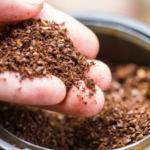Coriander seeds are one of those timeless kitchen staples that offer more than just flavor. Used in cuisines all over the world, these small, round seeds bring a warm, citrusy depth to dishes, making them a go-to for chefs and home cooks alike. From Indian curries to Middle Eastern stews, coriander_seeds find their way into an incredible variety of meals — both as whole seeds and ground into spice blends.
But these little seeds are more than just tasty — they pack a powerful health punch too. Whether you’re looking to boost digestion, fight inflammation, or even regulate blood sugar, coriander_seeds are backed by centuries of traditional use and modern research. In this article, we’ll explore how to use coriander_seeds, the many coriander seeds benefits, how to grind and store them, plus what to do when you need a substitute for coriander_seeds. Let’s dive in.
What Are Coriander Seeds?
 Coriander_seeds are the dried fruit of the Coriandrum sativum plant, commonly known as cilantro when referring to its leafy green form. These tiny yet flavorful seeds are used widely in global cuisines and are often celebrated for their dual purpose. While the fresh leaves are used as a herb, whole coriander_seeds are ground or toasted to be used as a warm, citrusy spice with earthy undertones.
Coriander_seeds are the dried fruit of the Coriandrum sativum plant, commonly known as cilantro when referring to its leafy green form. These tiny yet flavorful seeds are used widely in global cuisines and are often celebrated for their dual purpose. While the fresh leaves are used as a herb, whole coriander_seeds are ground or toasted to be used as a warm, citrusy spice with earthy undertones.
Across continents, from Indian curries to Mexican stews, coriander_seeds add depth, fragrance, and complexity to countless dishes. Whether you’re tossing them into a spice blend or grinding them fresh, these little seeds are a staple in kitchens worldwide. Their popularity is not only due to taste but also the many coriander seeds benefits that make them a favorite among health-conscious cooks.
Coriander Seeds Benefits: More Than Just a Spice
Beyond flavoring, coriander_seeds offer impressive health advantages. Let’s explore some of their most notable benefits:
1. Rich in Antioxidants
Coriander_seeds are loaded with antioxidants that help combat oxidative stress in the body. These antioxidants can neutralize free radicals, reducing inflammation and possibly lowering the risk of chronic diseases.
2. Supports Digestive Health
Due to their carminative properties, coriander_seeds promote better digestion and reduce bloating. Drinking coriander seed tea or adding them to your meals can relieve stomach discomfort and promote smoother digestion.
3. Balances Blood Sugar
Multiple studies suggest that coriander_seeds may help regulate blood sugar levels. This makes them especially useful for people managing diabetes or insulin sensitivity.
4. Boosts Immunity
These seeds also exhibit antimicrobial properties. When consumed regularly, they may help strengthen the immune system and fight off bacterial infections.
5. Promotes Heart Health
Coriander_seeds are thought to help reduce bad cholesterol (LDL) while boosting good cholesterol (HDL), making them an excellent addition to a heart-healthy diet.
How to Use Coriander Seeds in Cooking
There are multiple ways to incorporate coriander_seeds into your everyday cooking. The form you use—whole or ground—can affect the flavor and texture of your dishes.
Whole Coriander Seeds
-
Ideal for tempering in Indian curries and dals
-
Adds crunch and fragrance to pickles
-
Used in spice blends like garam masala and pickling spice
-
Excellent for flavoring rice and stews
Ground Coriander Seeds
-
Perfect for seasoning meats and vegetables
-
Adds an earthy taste to soups and stews
-
Can be blended into marinades and dressings
Whenever possible, grind the seeds fresh before using to maintain their natural oils and strong aroma.
How to Grind Coriander Seeds
Grinding coriander_seeds is easy, and doing it fresh ensures the most potent flavor.
Here’s how you can do it:
-
Dry roast the seeds in a skillet over low heat for 1–2 minutes.
-
Let them cool.
-
Use a spice grinder, mortar and pestle, or a coffee grinder.
-
Store the powder in an airtight jar away from light and moisture.
By following this simple method, you can elevate your dishes with freshly ground coriander seeds bursting with flavor.
How to Harvest Coriander Seeds

If you’re growing your own coriander (cilantro), you can easily harvest the seeds once the plant matures. Here’s how:
-
Wait for the plant to flower and produce small, round seed heads.
-
Allow them to dry on the plant as long as possible.
-
Once the heads turn brown, snip them off and hang upside down in a paper bag for further drying.
-
Shake the bag after a few days. The seeds will fall out easily.
-
Store the dried seeds in a sealed glass jar in a cool, dry place.
Substitute for Coriander Seeds: What Can You Use Instead?
If you’re out of coriander_seeds, don’t worry—there are several great substitutes that can mimic its flavor profile.
Best Coriander Seeds Substitutes:
-
Cumin Seeds: Earthy and slightly nutty, works well in savory dishes.
-
Caraway Seeds: Mildly sweet and peppery, excellent in breads and cabbage dishes.
-
Fennel Seeds: Adds a touch of licorice-like sweetness.
-
Curry Powder: Often contains coriander as a component.
-
Ground Coriander (if you have it): Works well in place of whole seeds, and vice versa.
Just remember to adjust the quantity as flavors may vary in strength.
How to Store Coriander Seeds
To ensure the longevity of both flavor and nutrients, coriander_seeds should be stored properly.
-
Keep in an airtight container
-
Place away from direct sunlight
-
Store whole seeds instead of ground, if possible
-
Avoid humidity or moisture-prone areas
Properly stored coriander_seeds can last for up to a year without losing their potency.
Tips for Cooking with Coriander Seeds
-
Dry roast seeds before grinding to intensify flavor.
-
Add whole seeds early in cooking for depth.
-
Add ground coriander late in cooking to preserve aroma.
-
Use in meat rubs, vegetable sautés, and even baked goods.
Bio Table
| Detail | Information |
|---|---|
| Botanical Name | Coriandrum sativum |
| Common Names | Coriander, Cilantro (leaves), Dhania (India) |
| Plant Family | Apiaceae |
| Flavor Profile | Warm, nutty, citrusy |
| Form Used | Whole or ground seeds |
| Best Substitutes | Cumin, caraway, fennel |
| Storage Tip | Airtight container, cool place |
| Health Benefits | Digestive aid, antioxidant, heart health |
Final Thoughts
Coriander_seeds are truly a spice cabinet essential. From their distinctive aroma and earthy taste to their medicinal benefits, there’s no denying their value in any kitchen. Whether you’re brewing tea to calm your stomach or seasoning a hearty stew, coriander_seeds always deliver something special. And knowing how to harvest, grind, and substitute them gives you full control over their use.
With so much versatility packed into such a small seed, it’s no surprise that coriander_seeds have stood the test of time in global cuisines. Keep a jar in your pantry — your dishes and your body will thank you.
FAQs
1. What are coriander seeds used for?
Coriander seeds are used in cooking, pickling, spice blends, and herbal remedies due to their aromatic and digestive properties.
2. Can you eat coriander seeds raw?
Yes, though they’re usually toasted or ground for better flavor. Eating them raw in moderation is safe and healthy.
3. How do I store ground coriander seeds?
Store them in an airtight jar in a cool, dry place. Use within 6 months for the best flavor.
4. What’s the difference between coriander and cilantro?
Cilantro refers to the fresh leaves, while coriander seeds refer to the dried fruit of the same plant.
5. Are coriander seeds good for weight loss?
Yes, they may help with digestion and reduce bloating, which can support weight management as part of a healthy lifestyle.






